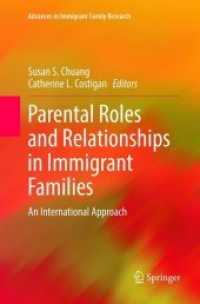Full Description
Click and Kin is an interdisciplinary examination of how our increasingly mobile and networked age is changing the experience of kinship and connection. Focusing on how identity formation is affected by quick media such as instant messaging, video chat, and social networks, the contributors to this collection use ethnographic and textual analyses, as well as autobiographical approaches, to demonstrate the ways in which the ability to communicate across national boundaries is transforming how we grow together and apart as families, communities, and nations.
The essays in Click and Kin span the globe, examining transnational connections that touch in the United States, Canada, Mexico, India, Pakistan, and elsewhere. Together, they offer a unique reflection on the intersection of new media, identity politics, and kinship in the twenty-first century.
Contents
Introduction (May Friedman and Silvia Schultermandl)
Between the Individual and an Imagined Community
1. "I Talk to My Family in Mexico but I Don't Know Them": Undocumented Young Adults Negotiating Belonging in the United States through Conversations with Mexico (Laura E. Enriquez)
2. "Learning and Practicing Democracy": Digital Diasporas and Negotiating a Transnational Civil Society (M. Tina Zarpour)
3. Negotiating Everyday Conversation of South Asian Transnational Identities in Social Media (Aparajita De and Shekh Moinuddin)
Shaping Identities
4. Queering "Web" Families: Cultural Kinship through Lesbian Web Series (Julia Obermayr)
5. Literary Letters and IMs: American Epistolary Novels as Regulatory Fictions (Silvia Schultermandl)
CyberAlternatives to Lived Identities
6. Digital Diasporic Experiences in Digital Queer Spaces (Ahmet Atay)
7. Claiming Ourselves as "Korean": Accounting for Adoptees within the Korean Diaspora in the United States (Kimberly McKee)
Disembodied Connections
8. Shifting Terrain: Exploring the History of Communication Through the Communication of My History (May Friedman)
9. Love knows no bound: (Re)defining Ambivalent Physical Boundary and Kinship in the World of ICTs (Isabella Ng)
10. The Internet Is Not A River: Space, Movement, and Relationality In A Wired World (Samuel Veissiere)







